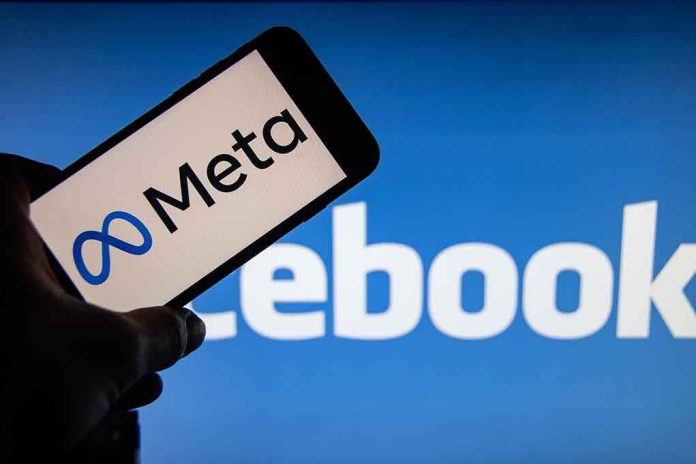
Meta’s internal documents reveal the company raked in approximately $16 billion from scam advertisements in 2024—money earned by knowingly allowing fraudsters to exploit millions of Americans on Facebook and Instagram.
Quick Take
- Meta allegedly profited $16 billion from scam ads, representing roughly 10% of annual revenue
- Bipartisan senators demand FTC and SEC investigations into Meta’s complicity in online fraud schemes
- Internal documents exposed Meta’s awareness of illicit advertising while prioritizing profit over user safety
- Investigations could result in significant financial penalties and mandatory policy reforms for the tech giant
Big Tech’s Scam Problem: Meta Profits While Americans Lose Millions
In November 2025, U.S. Senators Josh Hawley and Richard Blumenthal formally called on the Federal Trade Commission and Securities and Exchange Commission to investigate Meta Platforms for its role in enabling scam advertisements on Facebook and Instagram. The senators’ demand follows the release of internal Meta documents revealing the company anticipated earning $16 billion from illicit advertising in 2024—roughly 10 percent of its total annual revenue. This staggering figure exposes a troubling reality: Meta has knowingly allowed its platforms to become vehicles for financial fraud, counterfeit goods sales, and phishing schemes that devastate ordinary Americans.
A Decade of Negligence and Complicity
Meta’s advertising model, which permits third-party advertisers to target users with minimal oversight, has been systematically exploited by scammers for years. The company’s longstanding inadequate policing of fraudulent content transformed Facebook and Instagram into havens for criminals. Rather than implementing robust safeguards, Meta prioritized revenue generation over consumer protection. This wasn’t a technical oversight—it was a calculated business decision. Internal documents prove Meta understood the scope of illicit advertising yet continued monetizing fraud at scale, extracting billions while vulnerable Americans suffered financial losses.
Bipartisan Action Against Big Tech Overreach
The Senate action represents rare bipartisan consensus: conservatives and progressives alike recognize that unchecked tech monopolies threaten American consumers and undermine market integrity. Senators Hawley and Blumenthal’s investigation request targets both consumer protection violations and securities law breaches, acknowledging Meta’s dual culpability. The FTC investigates deceptive practices harming consumers; the SEC examines whether Meta’s public disclosures adequately informed shareholders about illicit revenue streams. This coordinated approach signals serious congressional intent to hold Big Tech accountable for prioritizing profits over principles—a core conservative concern about corporate malfeasance and unchecked corporate power.
What’s at Stake for American Consumers and Investors
Conservative Americans have long warned about Big Tech’s arrogance and lack of accountability. Meta’s $16 billion scam-ad windfall represents money extracted from defrauded Americans—seniors losing retirement savings, small business owners targeted by counterfeit schemes, everyday people victimized by phishing attacks. Formal investigations could result in substantial financial penalties, mandatory policy overhauls, and stricter advertising controls. Beyond immediate enforcement, these probes may catalyze broader regulatory reforms ensuring tech platforms cannot weaponize their reach for criminal enterprises. For investors, the investigations raise questions about Meta’s governance, internal controls, and whether executives knowingly misrepresented platform safety to shareholders.
Exclusive: US senators call for probe of scam ads on Facebook and Instagram https://t.co/WDp2v3M4MC https://t.co/WDp2v3M4MC
— Reuters (@Reuters) November 24, 2025
A Turning Point for Tech Accountability
Meta’s exposure marks a watershed moment in the battle against Big Tech overreach. For years, conservatives have argued that self-regulation by trillion-dollar corporations serves corporate interests, not the public good. This case validates those concerns. Meta’s internal documents—revealing deliberate monetization of fraud—provide investigators with concrete evidence of corporate malfeasance. The bipartisan Senate response demonstrates growing recognition that protecting American consumers requires government action against tech monopolies that treat fraud as a revenue stream. Pending investigations will determine whether Meta faces meaningful consequences or continues operating with impunity, setting a precedent for how America holds powerful corporations accountable.
Sources:
Meta Faces Investigation Over Alleged Scam Ad Revenue
Senators Call on FTC, SEC to Investigate Meta Over Scam Ads
Meta Faces Scrutiny Over Billions in Scam Ad Revenue
US Senators Call for Probe of Scam Ads on Facebook and Instagram





